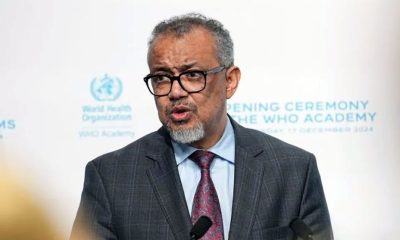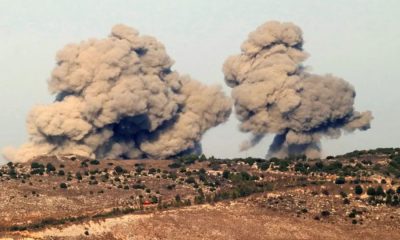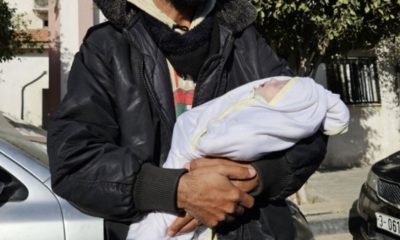International
Gaza: Israel expands war on medics to south Lebanon, rights group alleges
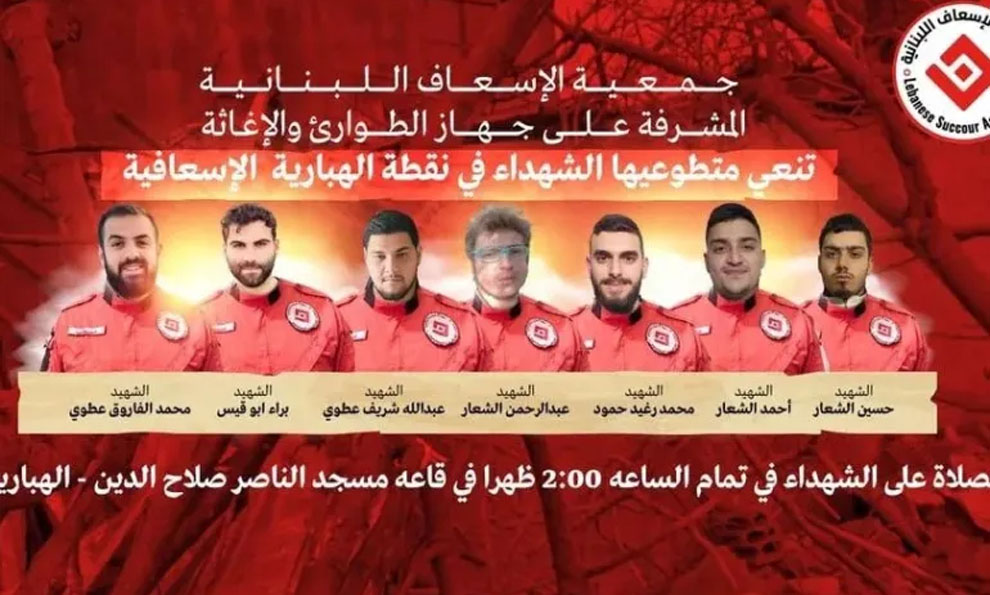
Gaza: Israel expands war on medics to south Lebanon, rights group alleges
Most evenings in al-Habbariyeh, a small town in southern Lebanon’s verdant hills, the young volunteers of the Lebanese Emergency and Relief Corps centre liked to get together to play cards or share an argileh (hookah).
On March 26, a clear, brisk night, Abdullah Sharif Atwi, Abdulrahman al-Shaar, Ahmad al-Shaar, Baraa Abu Qais, Hussein al-Shaar, Muhammad al-Farouq Atwi and Muhammad Ragheed Hammoud were in the second-floor hangout.
The Israeli drones hovered overhead, they had been going all day and now their sound was fading almost into the background.
The group was in high spirits, taking videos of themselves and joking about.
About half an hour after midnight, just into March 27, Israel hit the centre with an air strike, levelling the two-storey building.
“People from the village ran down to see what happened,” Ali Noureddine, a journalist and activist from al-Habbariyeh, told Al Jazeera. “It’s a small village,” he said. “We’re all one family.”
The seven young men had been killed and four others badly injured.
Most of the 18-to-25-year-olds had been students.
Hunted health workers
Israel killed a total of 17 people in three different towns just that day, 10 of them medical workers.
The attack made March 27 the deadliest day for medical workers in south Lebanon.
An attack on a cafe in Ras al-Naqoura killed a medical worker from Amal’s Al-Risala Scouts and three others, including one Amal member.
READ ALSO:
- Keyamo gets warm reception from UAE, Emirates officials, says airline fine-tuning Dubai-Lagos flight resumption
- NLC threatens First Bank for non-compliance with strike in Adamawa
- Ondo gov okays N35,000 wage award for tertiary institution workers
The third attack that day was in Tayr Harfa which killed two paramedics from Hezbollah’s Islamic Health Association along with four Hezbollah fighters.
The Israeli army spokesperson said the al-Habbariyeh attack successfully targeted a “significant terrorist” in al-Jamaa al-Islamiya.
“They didn’t say who the ‘terrorist’ was,” Mahyaddine Qarhani, director of the Lebanese Emergency and Relief Corps’ Ambulance Association, told Al Jazeera.
Investigations by human rights organisations found no evidence of military activity or fighters on-site.
Human Rights Watch called for the al-Habbariyeh attack to be investigated as a war crime as leading rights groups currently investigate other Israeli attacks on medical workers.
Hezbollah and Israel have been trading attacks across the border since October 8, the day after Israel launched its war on Gaza in retaliation for a Hamas-led attack on Israel in which 1,139 people were killed and about 240 others taken captive.
More than 92,600 people have been displaced from southern Lebanon by the relentless Israeli attacks, according to the International Organization for Migration.
The people still in the south are vulnerable, like the elderly and lower-income people who rely on the medical services the Lebanese Emergency and Relief Corps provides.
Like many services in the country, Lebanon’s healthcare is mostly privatised as the Ministry of Public Health relies on private groups and NGOs to fill the gaps.
The medical situation in Lebanon was already deeply affected by a five-year-old economic crisis, with 80 percent of the population below the poverty line.
Now, the south is also contending with war and with its few medical workers and facilities being targeted by Israel.
Data on the attacks on south Lebanon are hard to find, with locals saying many incidents go unreported.
Al Jazeera collected data from monitoring groups indicating at least 18 Israeli attacks on medical personnel and facilities, resulting in the deaths of 20 health workers, as of May 31.
They include members of Lebanon’s civil defence and health workers for the medical branches of Hezbollah, the Amal Movement and al-Jamaa al-Islamiya.
READ ALSO:
- US-based Nigerian lady killed by Metro bus had walk signal – Police
- What Nigerians will suffer if labour strike continues – Labour minister
- N6m land fraud allegation lands woman, daughter-in-law in Port Harcourt court
Each group has an armed wing engaging with the Israeli military but their healthcare workers are protected by international humanitarian law.
This protection as medical workers lapses only if they participate in military activities.
There has been no evidence that this was the case in any of the attacks on medical workers, multiple sources, including representatives of leading human rights and monitoring agencies, told Al Jazeera.
None of the attacks showed “evidence of any association with the armed wing of these groups”, Ameneh Mehvar, a Middle East specialist at ACLED, told Al Jazeera.
Possible war crimes
The attacks on medical workers in southern Lebanon have gone largely unreported, although they are contributing to significantly degrading the quality of life for the people left there.
Medical personnel cannot be targeted “even if they’re close to military targets”, Shane Darcy, a professor at the Irish Centre for Human Rights, told Al Jazeera.
“Even if there is a Hezbollah [fighter] present, the principle of proportionality means [Israel’s military] has to weigh the impact on civilian proportionality,” a source at a renowned human rights organisation told Al Jazeera, speaking on background.
There is no exact formula for proportionality, Darcy said, but targeting or killing civilians deliberately is a crime.
“There’s a lot of danger [for medical workers],” Dr Wahida Ghalayni, who works at the Ministry of Public Health, told Al Jazeera. “These are direct attacks [on them].”
The pattern of Israel’s lack of accountability and continued attacks leave Lebanon’s medical workers feeling Israel is directly targeting them.
A day before the al-Habbariyeh attack, on March 26, an Israeli air raid hit Tayr Harfa’s civil defence centre, injuring four health workers.
Then two Hezbollah paramedics “were killed in a second strike on the same location during the same day”, according to data collected by ACLED.
READ ALSO:
- Gunmen kill ex-Attorney General’s father in Nasarawa
- Gaza ceasefire plan turns deadly game of survival – BBC
- EFCC offers 5% reward to whistleblower in naira abuse case
“This is nothing new,” Rabieh Issa, civil defence commissioner for Al-Risala Scouts, told Al Jazeera.
“We don’t normally deploy until 15 minutes after the first hit because they hit again and again. So, for our own security, we wait a bit.”
But it is not only warplanes that the hunted medical personnel need to look out for.
On March 21, Israeli warplanes struck Yarine during fighting with Hezbollah, according to ACLED.
Israel said they were targeting Hezbollah’s military infrastructure but that does not explain why ambulances that rushed in after the attack came under “heavy machinegun fire” from the Israelis.
And there are many more incidents.
On March 4, a medical centre in the Al-Ouwayni neighbourhood of Odaisseh was hit by an Israeli air raid, killing three Hezbollah-affiliated health workers. On February 22, four people from Lebanon’s civil defence were killed in air attacks on Blida. On January 11, two medics were killed in the southern town of Hanin when Israeli jets struck the Islamic Health Society building.
Israel claims it is attacking “Hezbollah cells”. But in many of its attacks on medical workers or facilities, no fighters were killed.
In April, media outlet +972mag reported on Lavender, an artificial intelligence (AI)-supported system Israel uses to select targets for assassination and calculate “acceptable civilian loss” for each killing.
For a low-level Hamas operative, the Israeli army determined that 15-20 civilian deaths are permissible, while “the army on several occasions authorised the killing of more than 100 civilians in the assassination of a single commander”.
READ ALSO:
- Labour may call off strike today as FG promises minimum wage above N60,000
- MURIC condemns labour strike, says it’s a plan to frustrate Muslims
- Strike: Let’s avert another round of hardship, Sultan tells labour
“I’d find it hard for any international humanitarian lawyer to say that’s an acceptable application of proportionality,” Darcy said. “Those are possible war crimes.”
Gaps in the south
Back in al-Habbariyeh, the Israeli attack has left a big hole in the community.
“We’re a small village … all grieving,” Noureddine, who used to visit friends at the centre, said.
“Israel hits whoever they want. I don’t know if tomorrow someone else will die or not.”
But the decimated team has also left a big gap in the community’s medical care.
The Emergency and Relief Corps suspended operations in al-Habbariyeh after the attack, fearing that moving operations would simply attract attacks on civilians in other neighbourhoods.
“We can’t work in that area anymore,” Qarhani said. “Nobody knows why they hit the centre but it’s completely destroyed.”
The outskirts of al-Habbariyeh have been hit as recently as a month ago.
“Israel is still hitting us and if we make a new centre they’ll come and bomb it again,” Noureddine said. “They’re hitting civilians and we don’t have people whose lives we can simply sacrifice.”
“The Americans give Israelis weapons and hit us with them and no one will hold them accountable or will even look at what they’re doing,” Noureddine said.
“No one is held accountable for Israel’s attacks.”
Gaza: Israel expands war on medics to south Lebanon, rights group alleges
SOURCE: AL JAZEERA
International
Israel ejects Gaza hospital, detains medical personnel
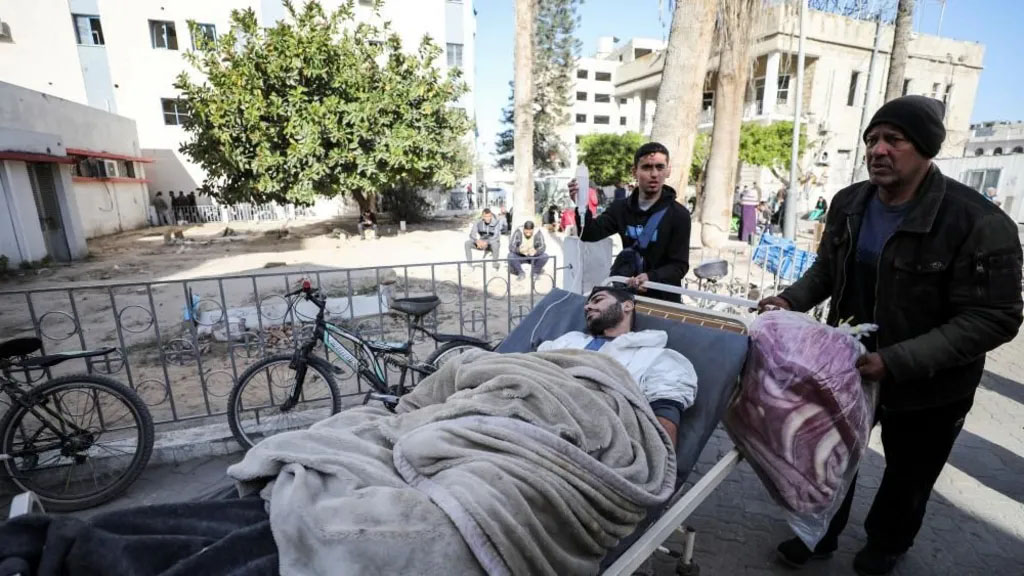
Israel ejects Gaza hospital, detains medical personnel
The last major functioning hospital in northern Gaza was forcibly evacuated by the Israeli military on Friday after dozens of people were reportedly killed in Israeli strikes targeting the area.
Medical staff, including the director of the Kamal Adwan Hospital, have also been detained, Gaza health officials said on Saturday.
The hospital director, Dr Hussam Abu Safiya, was among the first to report that about 50 people had been killed in Israeli air strikes targeting the vicinity of the hospital on Friday.
The IDF had said it was carrying out an operation in the area, alleging the hospital was a “Hamas terrorist stronghold”.
On Friday, patients at the hospital were forcibly moved to the nearby Indonesian Hospital which doctors warn is damaged and unsuitable due to a lack of power generators and water.
Eid Sabbah, head of the nursing department at Kamal Adwan, told the BBC the military had ordered the evacuation around 07:00 on Friday, giving the hospital about 15 minutes to move patients and staff into the courtyard.
Israeli troops then entered the hospital and removed the remaining patients, he said.
READ ALSO:
- We’re not aware of VeryDarkMan’s missing N180m — Police
- Trump asks Supreme Court to suspend law for TikTok ban
- Romeo and Juliet actress Olivia Hussey dies at 73
The IDF said it had “facilitated the secure evacuation of civilians, patients and medical personnel” before beginning the operation.
Seriously ill patients were moved to the nearby Indonesian Hospital, itself evacuated earlier in the week, which medics have described as non-functional.
“You can’t call it a hospital, it’s more of a shelter. It’s not equipped for patients,” Gaza’s deputy minister of health, Dr Abu-Al Rish, told the BBC on Friday.
Dr Sabbah, from Kamal Adwan Hospital, said: “It’s dangerous because there are patients in the ICU department in a coma and in need of ventilation machines and moving them will put them in danger.”
He had said critically ill patients needed to be moved in specialised vehicles.
The World Health Organization said the raid “has put this last major health facility in north Gaza out of service”.
“Initial reports indicate that some key departments were severely burnt and destroyed during the raid,” it posted on X on Friday.
Nadav Shoshani, international spokesman for the Israel Defense Forces (IDF), said in a post on Friday evening on X that a “small fire broke out in an empty building inside the hospital that is under control”.
This was when IDF troops were not inside the hospital, he said, adding that “after preliminary examination, no connection was found between IDF activity to the fire”.
The director of Kamal Adwan hospital had said on Friday that approximately 50 people had been killed, including five medical staff, in a series of Israeli air strikes targeting the vicinity of the hospital.
READ ALSO:
- Niger’s president faces fire at home over attack on Nigeria
- Israel attacks: UN warns humanitarian disaster in Yemen may get worse
- Wike: My fallout with Secondus was his opposition to Fubara
The statement from Dr Hussam Abu Safiya said a building opposite the hospital was targeted by Israeli warplanes, leading to the death of a paediatrician and a lab technician, as well as their families.
He said a third staff member who worked as a maintenance technician was targeted and killed as he rushed to the scene of the first strike.
Two of the hospital’s paramedics were 500m (1,640ft) away from the hospital when they were targeted and killed by another strike, the statement continued, with their bodies remaining in the street with no-one able to reach them.
The Israeli military said on Friday morning that it was “unaware of strikes in the area of Kamal Adwan hospital” and was looking into the reports that staff had been killed.
Kamal Adwan hospital in Beit Lahia has been under a tightening Israeli blockade imposed on parts of northern Gaza since October, when the military said it had launched an offensive to stop Hamas from regrouping there.
The UN has said the area is under a “near-total siege” as the Israeli military heavily restricts access of aid deliveries to an area where an estimated 10,000 to 15,000 people remain.
In recent days, the hospital’s administrators have issued desperate pleas appealing to be protected, as they say the facility has become a regular target for Israeli shelling and explosives.
Oxfam said that attempts by aid agencies to deliver supplies to the area since October had been unsuccessful because of “deliberate delays and systematic obstructions” by the Israeli military.
Additional reporting by Shaimaa Khalil
Israel ejects Gaza hospital, detains medical personnel
BBC
International
Trump asks Supreme Court to suspend law for TikTok ban
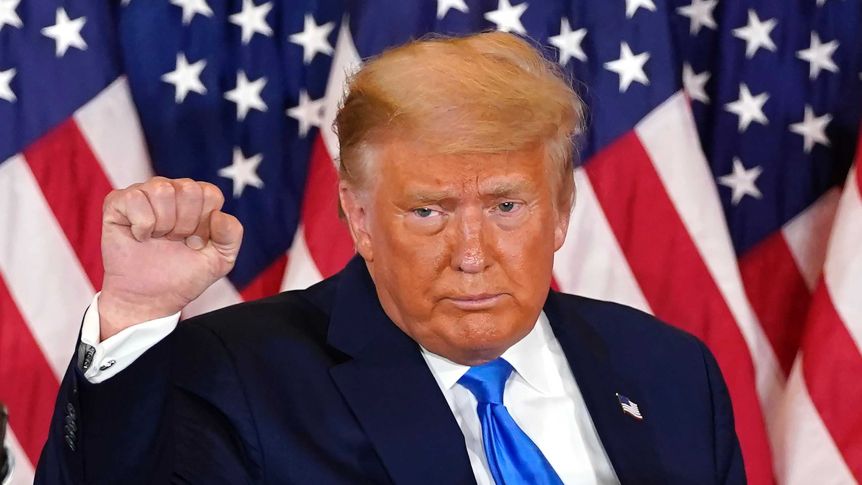
Trump asks Supreme Court to suspend law for TikTok ban
US President-elect Donald Trump filed a brief Friday urging the Supreme Court to pause a law that would ban TikTok the day before his January 20 inauguration if it is not sold by its Chinese owner ByteDance.
“In light of the novelty and difficulty of this case, the court should consider staying the statutory deadline to grant more breathing space to address these issues,” Trump’s legal team wrote, to give him “the opportunity to pursue a political resolution.”
Trump was fiercely opposed to TikTok during his 2017-21 first term, and tried in vain to ban the video app on national security grounds.
The Republican voiced concerns — echoed by political rivals — that the Chinese government might tap into US TikTok users’ data or manipulate what they see on the platform.
US officials had also voiced alarm over the popularity of the video-sharing app with young people, alleging that its parent company is subservient to Beijing and that the app is used to spread propaganda, claims denied by the company and the Chinese government.
Trump called for a US company to buy TikTok, with the government sharing in the sale price, and his successor Joe Biden went one stage further — signing a law to ban the app for the same reasons.
– Reversing course –
Trump has now, however, reversed course.
At a press conference last week, Trump said he has “a warm spot” for TikTok and that his administration would take a look at the app and the potential ban.
READ ALSO:
- Romeo and Juliet actress Olivia Hussey dies at 73
- Niger’s president faces fire at home over attack on Nigeria
- Israel attacks: UN warns humanitarian disaster in Yemen may get worse
Earlier this month, the president-elect met with TikTok CEO Shou Zi Chew at his Mar-a-Lago residence in Florida.
Recently, Trump told Bloomberg he had changed his mind about the app: “Now (that) I’m thinking about it, I’m for TikTok, because you need competition.”
“If you don’t have TikTok, you have Facebook and Instagram — and that’s, you know, that’s Zuckerberg.”
International
Romeo and Juliet actress Olivia Hussey dies at 73
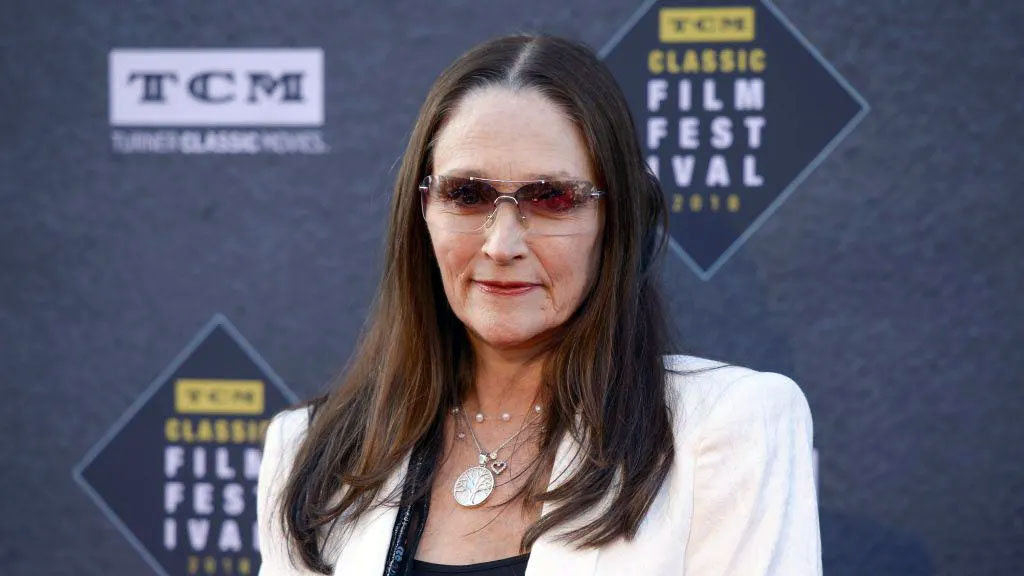
Romeo and Juliet actress Olivia Hussey dies at 73
Actress Olivia Hussey, who shot to international prominence as a teenager for her role in the acclaimed 1968 film version of Romeo and Juliet, has died aged 73.
The Argentinian-born actress, who grew up in London, died on Friday surrounded by her loved ones, a statement posted on her Instagram said.
Hussey won the best new actress Golden Globe for her part as Juliet, but decades later she sued Paramount Pictures for sexual abuse as she was aged just 15 when she filmed the movie’s nude scene.
Her other most notable screen role was as Mary, mother of Jesus, in 1977 TV miniseries Jesus of Nazareth.
“As we grieve this immense loss, we also celebrate Olivia’s enduring impact on our lives and the industry,” the statement said.
Hussey was born in Buenos Aires, Argentina, in 1951, before moving to London aged seven and studying at the Italia Conti Academy drama school.

1968’s Romeo and Juliet was nominated for best picture and director Oscars
She was 15 when Romeo and Juliet director Franco Zeffirelli discovered her onstage, playing opposite Vanessa Redgrave in the play The Prime of Miss Joan Brodie
READ ALSO:
- Niger’s president faces fire at home over attack on Nigeria
- Israel attacks: UN warns humanitarian disaster in Yemen may get worse
- Wike: My fallout with Secondus was his opposition to Fubara
Zeffirelli was looking for someone who was young enough to be a convincing Juliet in what he intended to be the definitive cinematic version of the Shakespeare play.
He cast Hussey alongisde British 16-year-old Leonard Whiting as Romeo in the film.
The film was nominated for an Oscar for best picture and director. Hussey missed out on an Oscar nomination herself in a strong year in which Barbra Streisand won the main award for Funny Girl.
But at that year’s Golden Globes Hussey won the award for best new star.
Decades later, she and Whiting sued Paramount Pictures alleging Zeffirelli – who died in 2019 – had encouraged them to film nude scenes despite previous assurances they would not have to.
The pair sought damages of more than $500m (£417m), based on suffering they said they had experienced and the revenue brought in by the film since its release.
But last year a judge dismissed the case, finding the scene was not “sufficiently sexually suggestive”.
In 1977, Hussey had reunited with Zeffirelli for Jesus of Nazareth to play the Virgin Mary, before appearing in Death on the Nile a year later based on Agatha Christie’s novel.
Her roles in early slasher film Black Christmas (1974) and TV film Psycho IV: The Beginning earned her recognition as a scream queen. In the latter, she p[layed Norman Bates’s mother in a prequel storyline.
In later years she also took on work as a voice actress, appearing frequently in video games.
But she did have one final reunion with her former Romeo – as she and Whiting appeared together in the 2015 British film Social Suicide, which was loosely based on Romeo and Juliet, albeit set in the social media era.
Romeo and Juliet actress Olivia Hussey dies at 73
BBC
-

 Business2 days ago
Business2 days agoBe creative, monarch, others challenge Muslim professionals on economic revival
-

 Auto1 day ago
Auto1 day agoLSM MD extols founder’s qualities after latter posthumous industry award
-

 Entertainment1 day ago
Entertainment1 day agoMultiChoice announces free access to all DSTV channels for 3 days
-

 metro2 days ago
metro2 days agoJigawa State governor loses son 24 hours after mother’s death
-

 News1 day ago
News1 day agoNigeria Customs Service begins 2025 recruitment [How to apply]
-

 metro1 day ago
metro1 day agoHeavy security in Ilesa as ex-Osun deputy gov emerges new Owa-Obokun
-

 metro24 hours ago
metro24 hours agoLagos Imam to Tinubu: You haven’t disappointed us
-

 metro1 day ago
metro1 day agoDangote, Tinubu, Lookman named among 100 most influential Africans in 2024 (Full list)



